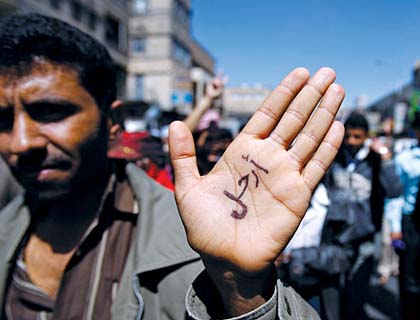SANAA – Yemen is a fertile land with beaches that stretch for more than 1,700km. It is also a country in which more than 10mn people are threatened by starvation, where thousands spend their lives sneaking into neighboring countries in search of better opportunities, and where children are violated in forced labor markets. In an age of extraordinary medical advances, the greatest hope of 24mn Yemenis is that their children are not crippled by polio. Man landed on the moon more than 40 years ago, but in Yemen, many still dream of traveling by car rather than donkey.
That is why the Yemeni revolution was formulated in the minds of the young long before it broke out on the ground. A failing economy and a deteriorating security situation, together with spiraling corruption, simply amplified most Yemeni people's daily experience of poverty, and disease.
The people's aspirations for something better were transformed into a crisis when President Ali Abdullah Saleh sought to extend his rule beyond 40 years and to bequeath Yemen - as if the country was one of his possessions - to his son. Young Yemenis could no longer contain their desire to become a real part of the world. We took to the streets - unarmed in a country where the people own more than 60mn guns. What we wanted was a modern civil state in Yemen. When we saw the success of the revolutions in Egypt and Tunisia, our determination to topple the Yemeni regime was heightened.
Students from the University of Sanaa went out on to the streets raising placards which called, for the first time, for the overthrow of the regime.
One hour after the toppling of Hosni Mubarak in Egypt, thousands of youths in the city of Taiz came out to celebrate, and to announce the start of the Yemeni revolution.
When the opposition parties joined in on February 21, it was clear that Saleh had lost all popular legitimacy and was now being propped up only by tribe, the army, vested economic interests and the international community.
We knew that if he was to fall, these elements must be overcome.
First, the tribes joined the revolution:
the Hashid and Bakil, the largest ethnic groups in Yemen, followed by all the others. In revenge, Saleh sent republican guard snipers to Sanaa, killing at least 45 andwounding hundreds . (Guardian)

